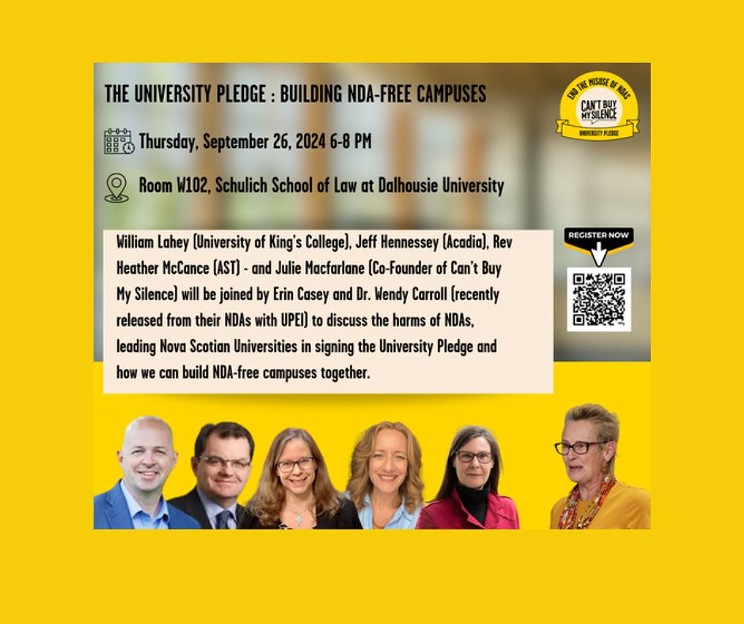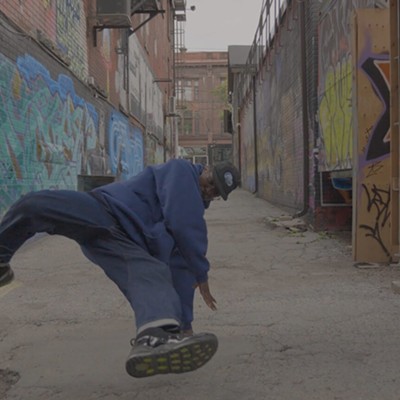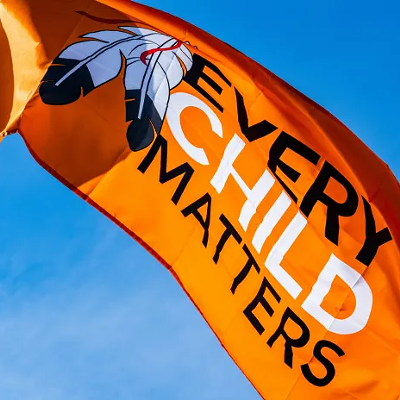The university pledge is simple enough: “(W)e [our vice-chancellor and higher education provider] commit to not using non-disclosure agreements to silence people who come forward to raise complaints of sexual harassment, discrimination, abuse or misconduct, or other forms of harassment and bullying.” However, only four schools in Canada have signed thus far. This week, there’s an event that’s working to change that.
On Thursday, Sep. 26, at 6pm at Dalhousie University’s Schulich School of Law, the Can’t By My Silence organization is holding an open event to discuss the specific harms of NDA misuse on university and college campuses, and the responsibilities of higher education leaders to end this practice. As per the event’s summary, this practice upholds the “fiction of NDAs for the same reason as corporations, churches and other institutions—safeguarding their reputation.”
CBMS co-founder and distinguished law professor emerita of the University of Windsor, Julie Macfarlane, will be speaking Thursday alongside the presidents of the three Nova Scotia universities that have signed the pledge: Jeff Hennessey from Acadia, Heather McCance of the Atlantic School of Theology and the University of King’s College’s William Lahey. They will be joined by two women, Wendy Carroll and Erin Casey, who were recently released from their NDAs signed in settlements with the University of PEI regarding allegations of sexual harassment against the former president of UPEI, Alaa Abd-El-Aziz. People interested in attending Thursday’s free event can register here.
NDAs are “standard clauses in settlement agreements,” says Macfarlane. “They're also standard in many universities’ complaints procedures so that, in a lot of cases, you've already bound yourself to an NDA before you’ve begun an investigation or a complaint.”
Can’t Buy My Silence, started by Macfarlane and Zelda Perkins, is committed to ending “the misuse of NDAs to buy victim’s silence.” The university pledge campaign, which began in the UK and expanded shortly thereafter to Canada, was created to encourage universities to commit to ending the misuse of NDAs until legislation makes it so.
In Canada, PEI is the only province thus far to pass legislation limiting the use of NDAs, so that they’re only included in settlements of harassment, discrimination, abuse or misconduct if requested by the person filing the complaint or grievance. In Nova Scotia, the NDP Caucus has tabled similar legislation, which is supported by the Liberals. So far, premier Tim Houston’s Progressive Conservative government has not made any commitments to passing this bill; however, justice minister Barbara Adams told the legislature last week that she’s met with CBMS to discuss reviewing legislation.
The CBMS campaign tracks legislative changes in government and institutions on their website here. For example, in December 2022 the Ontario government passed legislation banning universities in that province from using NDAs in cases of faculty-student sexual misconduct, and that legislation came into effect in July 2023. The CBMS updates legislative progress on NDA bans laid out here.
For example, says Macfarlane, “if someone who may have been sexually harassed by their graduate supervisor makes a complaint, then finds if they sign an NDA—they can't speak about it, or they'll get expelled from the university.” Ending this intimidating practice is why the pledge began.
“This isn't the corporate world,” says Macfarlane. “Universities should be setting an example and educating themselves about these and not using them, which is what’s happening in the UK,” where 100 universities have signed the pledge and where the government has made registration as a public institution dependent upon them not misusing NDAs.
So far only four Canadian universities have adopted the pledge: Nova Scotia’s Acadia, AST and King’s are joined by Columbia College in British Columbia.
The CBMS university pledge makes it clear on its website that schools that sign are not committing to ending the use of NDAs for their original purpose—”to protect commercially sensitive information, such as intellectual property and trade secrets.” Rather, when Acadia and King’s became the first to sign on in Canada in 2023, they were committing to the pledge’s actual intention of ending the misuse of NDAs in cases of harassment, discrimination and other abuses to “ensure that victims can speak about their experiences and that harmful behaviour is not hidden.”
There’s an unfortunate phrase for harmful behaviour hidden in educational spaces: “passing the trash.” This is when, for example, a complaint about an abusive employee at one school is settled—with everyone involved signing NDAs about the incident(s) in question—and the abuser is able to leave to get another job in another educational institution that isn’t aware of the circumstances of their dismissal or resignation.
The original reason Macfarlane started the CMBS campaign with Perkins is because that’s precisely what her school, the University of Windsor, did. “It passed the trash,” says Macfarlane. “It passed somebody who'd been investigated and terminated for serial harassment of students over many, many years.” Macfarlane has his termination letter. She says the university gave him “a letter of recommendation, an NDA and an undertaking that they would clear all personnel files, which had included complaints about him, going back a decade—and he went from Windsor to Trinidad.”
Macfarlane spoke up and told his new employer that her former colleague had been terminated for serial misconduct and, because of that, “he sued me for defamation in Trinidad,” she says. “The university refused to own up, so I have a defamation order against me in Trinidad for speaking the truth.”
For CBMS and Macfarlane, events like Thursday’s are about educating people within the universities and colleges—including students, staff, faculty, administrators, board members and legal counsels—about the harms caused to those who sign NDAs in cases of harassment and discrimination, including making sure that passing the trash ends. It’s about clearing up misunderstandings, too, on what signing the pledge means and doesn’t mean. It doesn’t mean everyone who previously signed NDAs is released from them, for example. Macfarlane says the reluctance of schools to sign on is “partly a misunderstanding about what kind of publicity survivors want, too.” She says it’s false mythology that survivors “want to put everything on social media or the front page of the press, when in fact most of them simply want to talk to their family, their friends, and perhaps a counsellor or therapist.”
Macfarlane says this “distorted view of what the dangers are is driven by a lot of paranoia about reputation,” which in the case of this pledge means the school's reputation. “But I really think this is overstated because it's going to look much worse very soon if you continue to use them than if you said you're not going to use them anymore.”
Can’t Buy My Silence has been talking with universities in Nova Scotia who are on the edge of signing, says Macfarlane. “What I'm really hoping is that this event—and hearing from the presidents and the two women who went through the experience they did at UPEI—will just be enough to nudge them over the line.”















